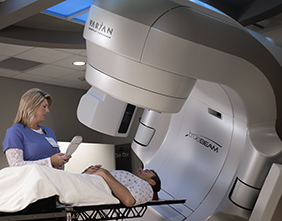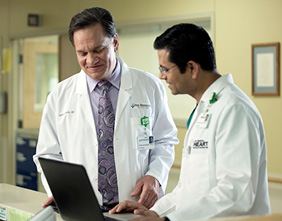Early Warning Heart Disease Screenings
One of the best things you can do for your heart and overall health is to be screened for cardiovascular disease.
Once you fully understand your risk of heart disease, you can begin to identify areas for improvement and work towards preventing complications. Lifestyle changes may be sufficient, but medicine or procedures may be necessary to improve your quality of life. Lima Memorial offers two affordable screening options: a CT cardiac calcium screening and a three-exam vascular screening.

What is CT Cardiac Calcium Scoring?
CT Cardiac Calcium Scoring is a test designed to determine a person’s risk of heart disease or cardiovascular disease. It is a non-invasive imaging procedure used to detect the smallest amount of calcium, or plaque, in your coronary arteries using a multi-slice CT scanner. This 10-minute test is the best step to take to detect early heart disease so your healthcare provider can determine if treatment is needed to prevent a heart attack or stroke.
Am I at Risk for Heart Disease?
The calcium score test helps determine treatment options for individuals between the ages of 40 and 70 who are at increased risk for heart disease.
You may benefit from a CT cardiac calcium score test if you have one or more of the following:
- Family history of coronary artery disease
- Diabetes
- High LDL cholesterol
- Low HDL cholesterol
- High blood pressure
- Tobacco use; currently smoking or previous smoker
- Overweight (body mass index [BMI] higher than 25) or obesity
- Peripheral artery disease
- Concern about risk for heart disease
- Inactive lifestyle
If you’re younger than 40 years old and high cholesterol runs in your family, you may want to consider the calcium scoring testing.
A physician’s referral is not required. This cardiac test is not recommended for patients who have had a previous coronary artery bypass grafting (CABG), stents placed, already have a known coronary artery disease or are under the age of 40.
Cost of a CT Cardiac Calcium Score Screening | $99
Find out your risk of heart disease today. Schedule your CT cardiac calcium scoring test with Lima Memorial Radiology by calling 419-226-5030.
FAQS
Q. How often should I have a calcium score test?
A. Studies show individuals may benefit from having this test performed every three to five years. Individuals should only repeat the test if they had a normal score the first time and want to confirm their risk is still low. If you have had a previous abnormal test, it is not helpful to retake the test, and it is recommended you work with your primary care provider or cardiologist for follow-up as necessary.
Q. Who shouldn’t get a calcium score test?
A. If you are pregnant, you should not have a calcium score test because a CT scan could harm a fetus.
A calcium score test may also not be helpful if you:
-
Don’t have any risk factors for heart disease.
-
Have a diagnosis of coronary artery disease.
-
Had prior treatment for coronary artery disease.
If you have any of the above conditions, it is important to talk to your healthcare provider about additional testing or treatment options.
Q. How is a calcium score test performed?
A. The calcium score test is a noninvasive test that uses a CT machine to scan your heart. If you have areas in your coronary arteries that have calcification it will appear on the scan. The CT scan takes only a few minutes, but the entire procedure may take about 10 or 15 minutes.
Q. How do I prepare for a calcium score test?
A. Before your calcium score test:
-
Tell your provider if you have any allergies, what medications you take and whether you are pregnant or could be pregnant.
-
Avoid food, drink, caffeine and tobacco products for four hours before your calcium score test.
-
You may be asked to remove any metal on your body, including jewelry and glasses.
-
You will be required to change into a hospital gown.
-
You will lie on your back on a special table that slides into the middle of a scanner with a doughnut shape.
-
Our provider will clean (and possibly shave) three small areas of your chest.
-
You will then have small, sticky electrode patches placed on the prepared areas. The electrodes attach to an electrocardiogram (EKG) monitor, which charts your heart’s electrical activity during the test and allows the provider to take pictures with your heartbeat.
Q. What should I expect during a calcium score test?
A. During the calcium score test:
-
You will feel the table under you move inside the scanner.
-
You can talk to and hear the person operating the machine in another part of the room. They can see you through a glass section of the wall.
-
The high-speed CT scan captures multiple images, synchronized with your heartbeat. You may be asked to hold your breath for 10 to 20 seconds.
-
A state-of-the-art computer program will analyze the images for calcification within your coronary arteries.
Q. What should I expect after a calcium score test?
A. After your calcium score test, you may resume all normal activities, including eating as usual.
Q. Are there risks or side effects with the calcium score test?
A. A calcium score test does not use an injection of contrast dye, so there are no side effects from that. There is a very small risk, especially if you have several CT scans and are younger than 40. A calcium score test exposes you to about the same amount of radiation as you would naturally get in a year. A CT scan can harm a fetus, so it is not recommended for pregnant people or those who suspect they may be pregnant.
Q. When will I get the results, and what do the results mean?
A. If you receive a positive test, it means the scan found evidence of calcium in your coronary arteries, which means you have coronary artery disease. You will also receive a number that tells you how much calcium they found.
The number you receive determines how much calcium is in your coronary arteries. If you have calcium in your heart’s arteries, a calcium score will be calculated to estimate the risk of coronary artery disease. Your calcium test score can range from zero to more than 1,000.
Anything above zero means there is some evidence of coronary artery disease (CAD).
Higher scores indicate that you could be at risk for a heart attack. Score cutoffs are:
-
100 or less (suggests mild coronary artery disease)
-
Up to 400 (suggests moderate coronary artery disease)
-
Above 400 (suggests severe coronary artery disease)
Q. If the results are abnormal, what are the next steps?
A. Based on the results of the scan, your primary care provider may recommend a visit with a cardiologist(heart specialist), lifestyle changes and / or medication.
Find out your risk of heart disease today. Schedule your CT cardiac calcium score test with Lima Memorial Radiology by calling 419-226-5030.

Vascular Screenings
Vascular screenings are essential to maintaining your health and well-being. Quick and
painless, these screenings can catch problems, such as plaque buildup in the arteries,
blockages or aneurysms, before they become serious and cause a heart attack or stroke.
Lima Memorial Health System offers a comprehensive cardiovascular screening comprised
of three different ultrasound exams for $75 and/or an EKG for $50.
Carotid Doppler:
This non-invasive test uses sound waves to measure blood flow through the carotid arteries. This portion of the exam will assist doctors in evaluating your risk of a stroke
Abdominal Aorta Exam:
This exam can detect ballooning of the aorta. Once weakened, the “balloon” can rupture and cause bleeding inside of the body. Abdominal aortic aneurysms are more prevalent in men and among people age 65 and older.
Ankle-Brachial Index:
This screening is performed by taking blood pressure measurements at the arms and ankles. The measurements are used to diagnose peripheral artery disease (PAD).
12-LEAD EKG:
This screening records the electrical signals in the heart detecting potential issues before they become a problem. This gives valuable insight into the heart’s health.
Should You Schedule a Vascular Screening?
You may qualify if you answer “yes” to any of the following:
- Have you been diagnosed with diabetes?
- Are you 40 years of age or older?
- Are you a current or past smoker?
- Have you been diagnosed with high blood pressure or high cholesterol?
- Do you have a family history of heart attack or carotid artery disease?
- Do you have a family history of AAA?
- Do you have excess weight?
- Do you have sores on your feet or legs that are slow to heal?
- Do you have aching, cramping or pain in your limbs while exercising?
If you are at risk, it is recommended that you get a screening every 3 – 5 years. If you have type 1 diabetes, you should consider getting screened beginning at age 30.
Cost of Vascular Screenings | $75
Cost of 12-Lead EKG | $50
For more information on these services or to schedule an appointment, call 419-226-5030. You do not need a doctor’s order to schedule the screenings. All three ultrasound exams are offered for $75 and/or an EKG for $50 and can be scheduled together or separate. Insurance does not cover the cost of screenings, but you may use a Flexible Spending Account or Health Savings Account.
Same-Day Cardiology Appointment
At Lima Memorial, we’re dedicated to keeping your heart healthy and your mind at ease. That’s why we offer same-day appointments with our world-class cardiology department.
To contact Lima Memorial Heart and Vascular Institute, or to learn more about same-day appointments, please click here.
Medical Services




